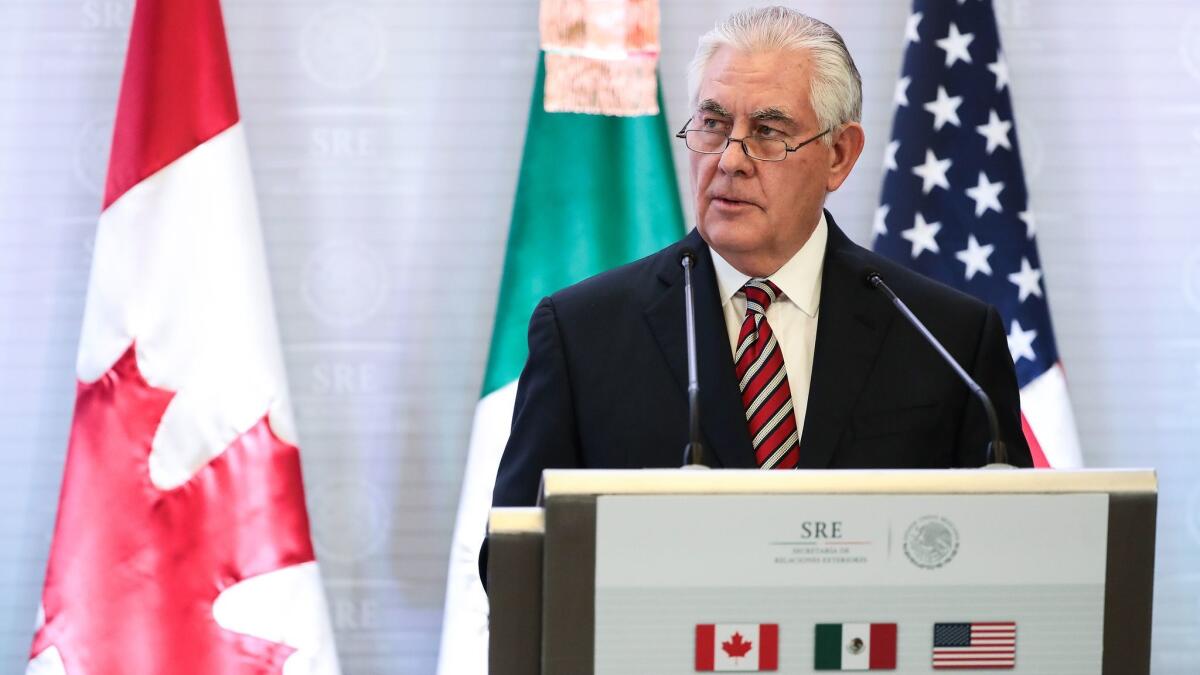Tillerson tries to ease Mexican worries about NAFTA, immigration — and Trump

- Share via
Reporting from Mexico City — U.S. relations with Mexico have been in a tailspin for the last year over President Trump’s anti-immigrant jibes, his threats to scuttle a crucial trade pact, demands that Mexico pay for a border wall and his apparent antipathy toward Mexico’s president.
On Friday, Secretary of State Rex Tillerson assumed his now-familiar role of damage controller and held talks with Mexico’s President Enrique Peña Nieto and other senior officials in an effort to repair relations with one of the United States’ largest trading partners and, historically at least, one of its closest allies.
If there were no breakthroughs, there were no ruptures either after Tillerson met with the Mexican and Canadian foreign ministers, Luis Videgaray and Chrystia Freeland. All three are involved in trying to renegotiate the North American Free Trade Agreement, a trilateral trade deal that Trump has threatened to kill.
At a news conference after the meetings, Tillerson defended Trump’s attempts to “modernize” the NAFTA agreement, and to crack down on both legal and illegal immigration. He said the president wants to “clean up” the troubled U.S. immigration system and “lift the cloud of uncertainty” on immigrants living without proper documentation.
“I know it’s painful, the process,” Tillerson said as the three diplomats stood before their nations’ flags.
Freeland praised Tillerson as “an incredibly important voice in maintaining the rules-based international order,” an implicit rebuff of Trump’s more freestyle flouting of diplomatic norms.
Videgaray also painted a rosy picture, telling reporters he is confident the trade talks won’t become a “chess game” with winners and losers but will produce a “win-win-win” outcome benefiting all three countries. The sixth round of NAFTA talks ended this week in Washington and will resume later this month in Mexico.
Some Mexican officials have threatened to curb cooperation with Washington in the fights against illegal immigration and drug trafficking if the NAFTA talks collapse, but both governments say that has not happened.
Tillerson’s visit here marked the start of a five-nation tour of Latin America and the Caribbean, his first multi-country mission in the region. He next flies to Bariloche, Argentina. From there, he continues to the Argentine capital of Buenos Aires; Lima, Peru; Bogota, Colombia, and Kingston, Jamaica.
Mexico, like much of Latin America, is at odds with the Trump administration over numerous policies.
Stepped-up deportation of Mexicans living in the U.S. without proper documentation, for example, has a direct impact on Mexico’s economy. Last year, Mexicans working in the U.S. sent their families in Mexico nearly $28 billion in remittances, an amount 6.6% higher than in 2016, the Bank of Mexico reported Friday.
The bank said this was the largest sum of remittances on record.
Outside the marble halls of the Mexican presidential compound, Los Pinos, and the Foreign Ministry, the reception for Tillerson was decidedly frosty. Protesters on the street called for his ouster, and a financial newspaper editorialized that he was preaching “primal colonialism.”
“The question is, what else is Videgaray giving to Trump and his collaborators in exchange for preserving NAFTA?” political columnist Salvador Garcia Soto wrote in El Universal newspaper.
That came partly in response to reports floated in the U.S. that Washington would make concessions on NAFTA if Mexico allowed armed air marshals on commercial flights between the two countries.
Videgaray has denied such “quid pro quo” and said any decision on NAFTA will be carefully analyzed. But he has been criticized here for “opaque” maneuvering.
Tillerson “is eager to cement the security cooperation relationship as much as possible so that it doesn’t get contaminated by the NAFTA talks should they turn sour,” said Eric Olson, senior advisor to the Mexico Institute at the nonpartisan Wilson Center think tank in Washington.
“So far, the Mexican government has been a willing partner in these discussions,” Olson added. But that could change if no progress is made — or if a leftist president is elected in voting scheduled for July 1.
Andres Manuel Lopez Obrador, a nationalist from the left, is riding a surge in anti-American sentiment to lead the polls so far.
The Mexican military, meanwhile, has enjoyed unusually good relations with the Pentagon. The two nations’ military forces and intelligence agencies cooperate closely on drug interdiction and arrests of drug cartel figures.
But Mexican military officers also are worried about a backlash in or against Mexico if NAFTA collapses — or the wall is built — and are considering contingency plans, people with knowledge of the deliberations said.
For more on international affairs, follow @TracyKWilkinson on Twitter
More to Read
Sign up for Essential California
The most important California stories and recommendations in your inbox every morning.
You may occasionally receive promotional content from the Los Angeles Times.














